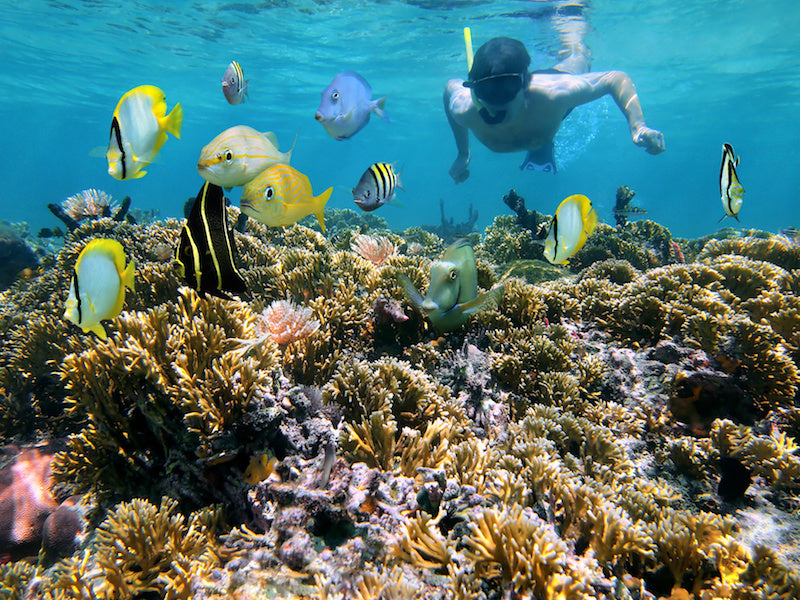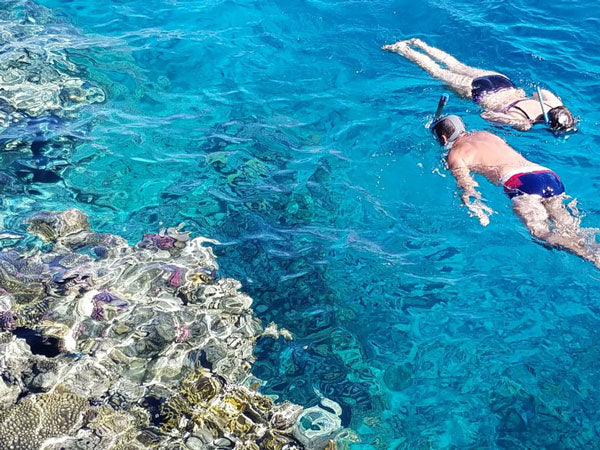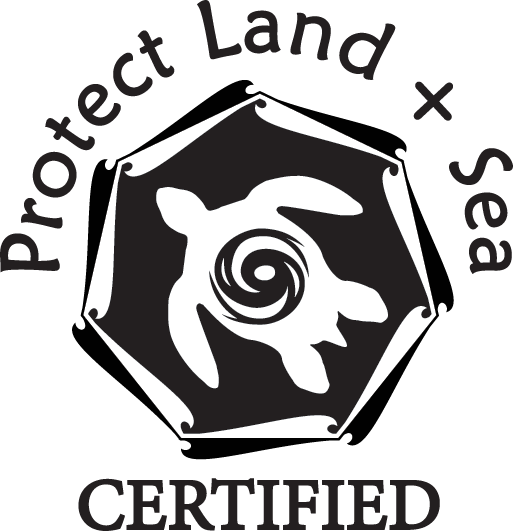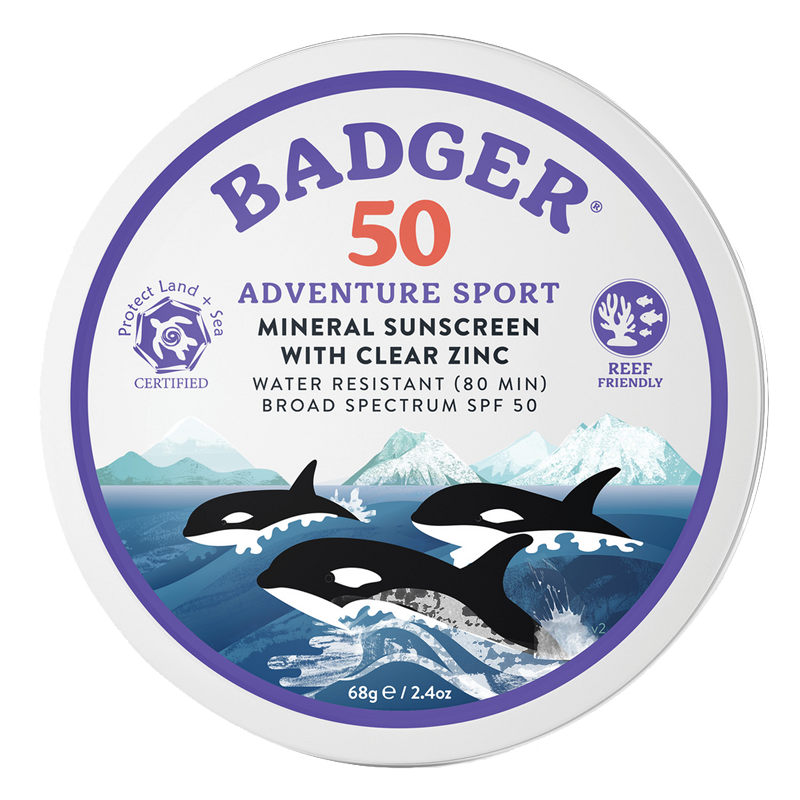Some sunscreen ingredients have been shown to kill coral and damage coral reefs
These ingredients include oxybenzone octinoxate commonly found in conventional chemical sunscreens.
Reef Safe Sunscreens do not contain any of these chemicals and won't harm coral
The 'Reef Safe' claim is unregulated so you really have to read the ingredients and know what to look for.
Badger's sunscreens all use zinc oxide as their only active ingredient and are reef safe
In fact, we were one of the first sunscreen brands to receive the Protect Land & Sea Certification.

Between 6,000 and 14,000 tons of sunscreen washes off swimmers, scuba divers, and snorkelers into coral reef environments each year. Even more sunscreen pollution can reach coastal areas via waste water discharges. Up to 10% of the world's coral reefs may be threatened by certain chemicals found in most sunscreens.
Four common sunscreen ingredients were shown to kill or bleach coral at extremely low concentrations (as low as one drop in 6.5 Olympic sized swimming pools).
Oxybenzone (Benzophenone-3, BP-3) - Sunscreen ingredient that disrupts coral reproduction, causes coral bleaching, and damages coral DNA. Oxybenzone is found in over 3500 sunscreen products worldwide. Butylparaben - Preservative ingredient shown to cause coral bleaching. Octinoxate (Ethylhexyl methoxycinnamate) - Sunscreen ingredient shown to cause coral bleaching. 4-methylbenzylidene camphor (4MBC) - Sunscreen ingredient shown to cause coral bleaching. Allowed in Europe and Canada, not in USA or Japan.
Some key scientific studies:
Oxybenzone contamination from sunscreen pollution and its ecological threat to Hanauma Bay, Oahu, Hawaii, U.S.A. Chemosphere Downs C.A. et al. February 2021
Toxicopathological Effects of the Sunscreen UV Filter, Oxybenzone (Benzophenone-3), on Coral Planulae and Cultured Primary Cells and Its Environmental Contamination in Hawaii and the U.S. Virgin Islands. Archives of Environmental Contamination and Toxicology. Downs C.A. et al. February 2016
Sunscreens Cause Coral Bleaching by Promoting Viral Infections. Environmental Health Perspectives. Danovaro R, et al. April 2008

"Reef-harming sunscreens are now banned from all national marine parks in Thailand" - Time Out Bangkok 2021
"Hawaii State law prohibits the sale, offer of sale, and distribution of sunscreens that contain the chemicals oxybenzone and octinoxate in the Hawaiian Islands." - Hawaii Tourism Authority 2021
"USVI Sunscreen Ban Takes Effect" - Travel Agent 2020
"Palau is first country to ban 'reef toxic' sunscreen" - BBC 2020
"Key West Bans Sunscreen Containing Chemicals Believed to Harm Coral Reefs" - New York Times 2019
"Most Sunscreens Can Harm Coral Reefs" - New York Times 2018
"Can We Create Sunscreen That Protects Both Humans and Coral Reefs?" - Smithsonian Magazine 2018

The Haereticus Environmental Laboratory researches the effects of sunscreens and other personal care ingredients on coral reefs and on other ecosystems and wildlife. Their HEL LIST is a list of personal care and sunscreen ingredients that are known environmental pollutants and threaten ecosystem health. This list includes:
Oxybenzone - Octinoxate - Octocrylene
4-methylbenzylidene camphor - Para-aminobenzoic acid (PABA)
Parabens - Triclosan
Microplastic spheres or beads
Nanoparticles including of zinc oxide or titanium dioxide
In 2020 the Haereticus Environmental Laboratory tested two Badger sunscreens and they were free of any of these ingredients earning us one of the very first Protect Land & Sea Certifications! Check out our Protect Land & Sea Certified sunscreen in a tin!

Between 6,000 and 14,000 tons of sunscreen washes off swimmers, scuba divers, and snorkelers into coral reef environments each year. Even more sunscreen pollution can reach coastal areas via waste water discharges. Up to 10% of the world's coral reefs may be threatened by certain chemicals found in most sunscreens.
Four common sunscreen ingredients were shown to kill or bleach coral at extremely low concentrations (as low as one drop in 6.5 Olympic sized swimming pools).
Oxybenzone (Benzophenone-3, BP-3) - Sunscreen ingredient that disrupts coral reproduction, causes coral bleaching, and damages coral DNA. Oxybenzone is found in over 3500 sunscreen products worldwide. Butylparaben - Preservative ingredient shown to cause coral bleaching. Octinoxate (Ethylhexyl methoxycinnamate) - Sunscreen ingredient shown to cause coral bleaching. 4-methylbenzylidene camphor (4MBC) - Sunscreen ingredient shown to cause coral bleaching. Allowed in Europe and Canada, not in USA or Japan.
Some key scientific studies:
Oxybenzone contamination from sunscreen pollution and its ecological threat to Hanauma Bay, Oahu, Hawaii, U.S.A. Chemosphere Downs C.A. et al. February 2021
Toxicopathological Effects of the Sunscreen UV Filter, Oxybenzone (Benzophenone-3), on Coral Planulae and Cultured Primary Cells and Its Environmental Contamination in Hawaii and the U.S. Virgin Islands. Archives of Environmental Contamination and Toxicology. Downs C.A. et al. February 2016
Sunscreens Cause Coral Bleaching by Promoting Viral Infections. Environmental Health Perspectives. Danovaro R, et al. April 2008

"Reef-harming sunscreens are now banned from all national marine parks in Thailand" - Time Out Bangkok 2021
"Hawaii State law prohibits the sale, offer of sale, and distribution of sunscreens that contain the chemicals oxybenzone and octinoxate in the Hawaiian Islands." - Hawaii Tourism Authority 2021
"USVI Sunscreen Ban Takes Effect" - Travel Agent 2020
"Palau is first country to ban 'reef toxic' sunscreen" - BBC 2020
"Key West Bans Sunscreen Containing Chemicals Believed to Harm Coral Reefs" - New York Times 2019
"Most Sunscreens Can Harm Coral Reefs" - New York Times 2018
"Can We Create Sunscreen That Protects Both Humans and Coral Reefs?" - Smithsonian Magazine 2018

The Haereticus Environmental Laboratory researches the effects of sunscreens and other personal care ingredients on coral reefs and on other ecosystems and wildlife. Their HEL LIST is a list of personal care and sunscreen ingredients that are known environmental pollutants and threaten ecosystem health. This list includes:
Oxybenzone - Octinoxate - Octocrylene
4-methylbenzylidene camphor - Para-aminobenzoic acid (PABA)
Parabens - Triclosan
Microplastic spheres or beads
Nanoparticles including of zinc oxide or titanium dioxide
In 2020 the Haereticus Environmental Laboratory tested two Badger sunscreens and they were free of any of these ingredients earning us one of the very first Protect Land & Sea Certifications! Check out our Protect Land & Sea Certified sunscreen in a tin!

In 2020 the Haereticus Environmental Laboratory tested two Badger sunscreens as free from ingredients or contaminants shown to harm coral reefs or delicate marine ecosystems earning us one of the very first Protect Land & Sea Certifications!
BUY NOWMore about Reef Safe Sunscreens
Badger sunscreens do not contain any of the ingredients shown to harm coral. Not only do we not use any of the harmful ingredients on the HEL LIST (see above) but we had two of our sunscreens tested by and they were found to be free of any of these ingredients earning us one of the very first Protect Land & Sea Certifications! Learn more from the Haereticus Environmental Laboratory.
The only active ingredient in each of our sunscreens is the mineral zinc oxide, and we do not use nano sized zinc. This has been used in skin care for thousands of years and is the same ingredient used in diaper creams, calamine lotion, and toothpastes. It is a powdered mineral that does not dissolve in seawater and because our zinc oxide is has a large particle size it rapidly settles to the seafloor and becomes part of the sediment. Read more about zinc oxide.
The inactive ingredients of our naturally water-resistant sunscreens are USDA organic plant oils, beeswax, vitamin E, and other ingredients that are sustainably sourced from plants, minerals, or are a product of fermentation. These are safe for any environment or ecosystem.
Reef Safe Sunscreen or Reef Friendly Sunscreen claims labels are unregulated and therefore potentially meaningless. You really have to look at the ingredients and judge for yourself. Look at the active and inactive ingredients on your sunscreen label. Do not use a sunscreen that contains oxybenzone, octinoxate or the other ingredients listed above that are shown to kill coral. The US National Park Service, PADI (the Professional Association of Underwater Instructors), and numerous eco-tour operators (including coral reef parks in Mexico) recommend that you avoid sunscreens with oxybenzone and use only mineral based sunscreens to help protect coral reefs.
Use a water resistant sunscreen which will be more likely to stay on your skin and out of the water. Water resistant claims are regulated by the FDA. Use a sunscreen that has been tested biodegradable ensuring that the product will break down in the marine environment. This claim is under-regulated so you may need to contact the company to verify their claim. Use common sense before even reaching for a sunscreen. Cover yourself with a hat and shirt (or a rash guard in the water), and seek shade during peak sun hours. Share this information with your friends!
Reef Safe vs. Reef Friendly: You may have noticed both of these terms being used in sunscreen articles and by sunscreen companies, even here at Badger. While they essentially mean the same thing we see a difference. To us, ‘reef safe’ is a product safety claim that should be backed up by scientific proof that the product was tested on living coral and caused it no harm. However, there are no standardized test to prove that a sunscreen is 100% safe for coral. The best we can do is to guarantee that our sunscreens don’t contain any of the ingredients shown to harm coral, and for this we use the term ‘reef friendly’. We sometimes use both terms interchangeably on our website and in our writings because people recognize the term ‘reef safe sunscreen’ over ‘reef friendly sunscreen’ but we have chosen to only use ‘reef friendly’ on our sunscreen packaging.
Global warming, pollution, and other human activities pose additional and significant threats to the survival of coral reefs. However, the results of these sunscreen studies should be taken seriously and if you plan to swim, scuba dive, or snorkel near coral reefs you should use a coral reef friendly or reef safe sunscreen. How can you tell if a sunscreen is safe for coral reefs?
Reef Safe Sunscreen or Reef Friendly Sunscreen claims labels are unregulated and therefore potentially meaningless. You really have to look at the ingredients and judge for yourself.
Reefs at Risk Video
Hawaii Bans Sunscreens with Oxybenzone








